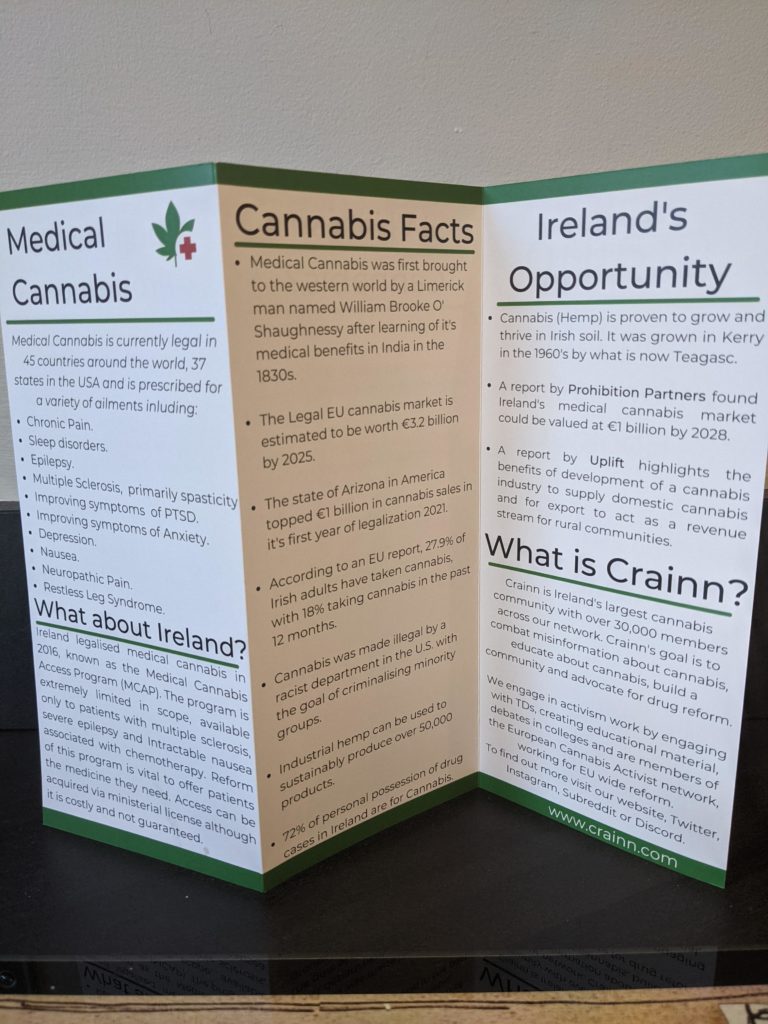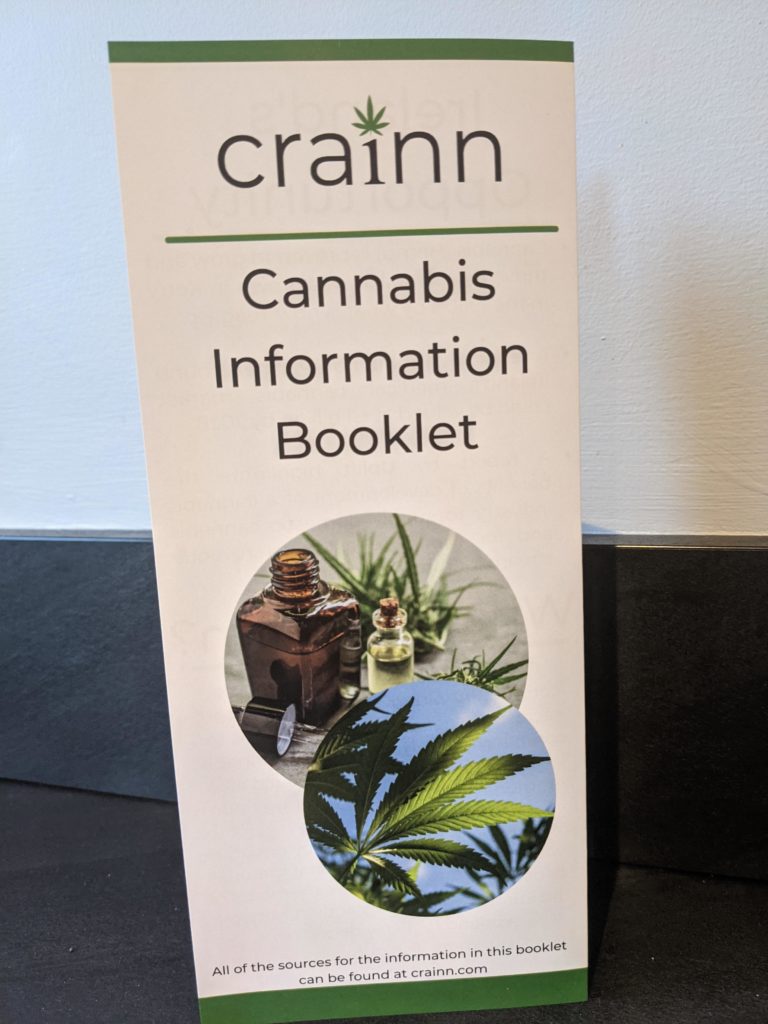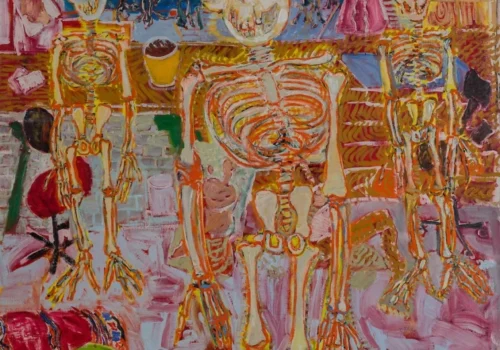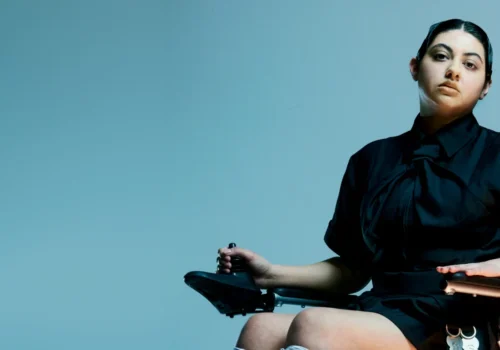Crainn is taking to the streets to educate Dublin on 4/20
Words: Eva O’Beirne
Graphics: Crainn
From 13:00 today, members of the cannabis community Crainn will be taking to Dublin’s streets to educate the general public on why drug laws in Ireland need to change.
From reducing stigma to tackling synthetic and spiked drugs, Crainn sat down with District to highlight how a prohibitionist model doesn’t help anyone.
Last time Crainn spoke to District, the community had 28,000 thousand members. Now it has 30,100.
But what does it mean to be a member of Crainn?
According to Dave, one of its members, Crainn “means many different things for many different people”. He is joined over Zoom by Ryan and Brendan, both fellow Crainn members.
“Some people use [cannabis] recreationally and share their experiences, some people share music or cooking recipes. People who grow share advice on that topic, and people who have just moved to Ireland seek advice from the subreddit and stay for the community aspect. The networks bring people together,’ Dave explained.
Recent discourse surrounding the delayed Citizens Assembly on Drugs has sparked the nation’s interest in what the legalisation of cannabis would mean for Ireland. To Crainn, legalisation would be the first step towards reducing drug stigma.
“We want to remove the idea that people who smoke cannabis are these shady people,” said Ryan. “After all, around twenty per cent of the population who has used it,” Brendan interjected.
According to a 2021 poll by the Journal, almost 40 per cent of Irish people are in favour of legalising cannabis for recreational purposes and over 90 are in favour of it being used for medical reasons. So how likely is it that Ireland will legalise it? According to Crainn, the government needs to abandon their current perception of cannabis users before addressing the issue.
“The new reasons that policy-makers are using to justify why cannabis is illegal don’t really make sense,” Ryan commented.
“They’re effectively playing catch-up. There is no real scientific reason for cannabis to be illegal, especially when compared to the harms of alcohol.”
Legalisation of cannabis has been an ongoing conversation in EU countries for the past year, with Germany and Malta promising to legalise the drug for recreational purposes in the next twelve months. Minister for Drugs Frank Feighan has previously told the Oireachtas health committee that decriminalising drugs “isn’t compatible with the Irish legal system” – something Brendan finds “difficult to tolerate”.
“I had a look at the debate, the 1975 debate, where we made drugs illegal and it shows that Charles Haughey warned against the dangers of giving the Gardaí special powers under this act. It is the removal of these powers that are incompatible under Irish law,” Brendan explained.
“The Drugs Act, other than terrorism, are the only reasons why Gardaí can stop and search someone. That is why there’s a hesitancy to give up this legislation – it’s not really about drugs at all anymore,” he continued.
According to Brendan, minor drug convictions ruin lives due to stigma by employers: “It’s distorted policing at the end of the day, they target young people, working-class people more than most.”
All three members agree that both Fianna Fáil and Fine Gael are too eager to whip out stereotypes and misinformation when it comes to discussing cannabis reform, something Crainn hopes to combat with its information campaign today.

The recent Drug Use in Higher Education Ireland survey found that cannabis was the most commonly used drug by students. So why isn’t legalisation on the cards, if not to prevent spiked drugs from being taken?
The increased presence of synthetic drugs in Ireland is an area of concern for Crainn, especially how the Irish media have reported on incidents and deaths to do with this issue. Dave pointed to a case in the UK where a woman had consumed spiked synthetic cannabis jellies, and the Irish media reported on it as if it was solely cannabis. Dave also acknowledged how sniffer dogs are useless against the influx of synthetics in the market.
Some studies have indicated the whole European market for cannabis is contaminated, and it isn’t safe to continue a prohibitionist model. People think that they’re buying cannabis, but instead they’re injesting synthetics.
Crainn
Currently, Ireland is not conducting back-of-house testing for seized cannabis goods in customs. “People who are prohibitionists hire other prohibitionists,” noted Brendan. To Crainn, it appears that the Irish government simply don’t want to acknowledge that this problem of spiking exists, at the detriment of the population.
The absence of testing centres at festivals and other events is “hurting people” according to Crainn. Ryan described how drug testing at festivals does not encourage drug use but rather reduces drug harm.
“And it helps paramedics,” noted Dave. “It would be a great help to know exactly what a person has consumed. A medic can’t just guess what you’ve taken.”
“We make vast accommodations for alcohol in society,” explained Brendan. “With Garda co-operation, we could have testing centres at these events.”
You may be wondering what you can expect from their information day today. Crainn has three core pillars: normalisation, education and community, with their pamphlet focusing on misinformation around cannabis and what prohibition means for Ireland.
“We’d like the general public to talk to us, take a pamphlet and sign up to their newsletter so they can keep up to date with what we do as a community,” explained Dave.
Crainn is removing some of its anonymity today by campaigning in person, something that took a lot of encouragement according to Ryan. “People are quite afraid to come forward, and obviously the stigma is huge. We’ve hosted online events before that have been well-attended but finding people who wanted to campaign in-person was a bit difficult.”
“The main thing that we’ve repeated to all of our volunteers is that it isn’t illegal to talk about cannabis. You’re not doing anything illegal by having a conversation in the street. We’re all stronger together at the end of the day,” he continued.

“The more people have these types of events, these types of conversations, the sooner we’ll see change.”
Crainn
As for the future? Crainn hope to grow as a community, organise more information days and work on an EU level with the European Cannabis Activist Network (ECAN). This network plans to examine the incoming German and Maltese models, as well as assist legislators across Europe.
So if you are interested in decriminalisation or simply want to know more about Crainn as an organisation, members of the Crainn community will be on O’Connell Street and Grafton Street from 13:00 to 14:30 today.
Not in Dublin? You can check out their socials for more information.
Elsewhere on District: Ryan Tubridy asked Jamie Lee O’Donnell the age question…four years ago





